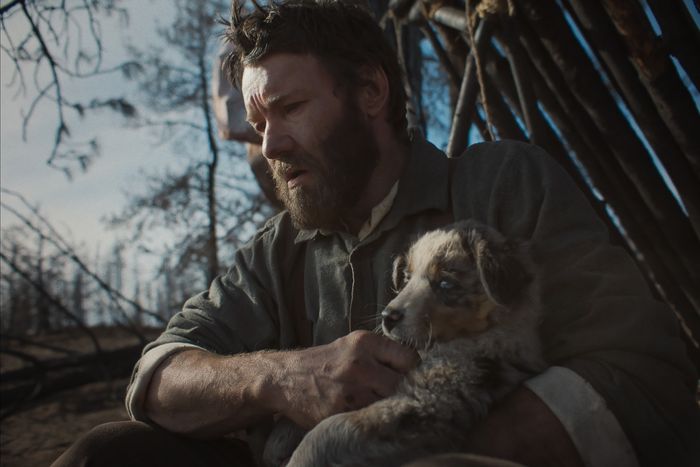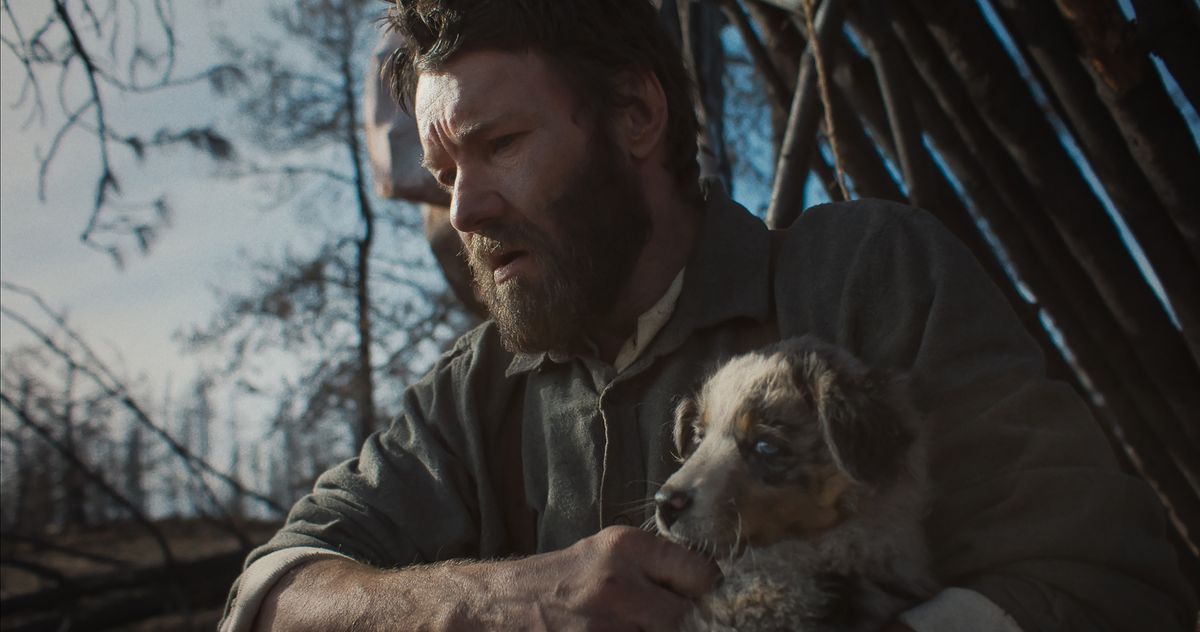
Spoilers follow for Train Dreams, which is streaming on Netflix.
In Train Dreams, Joel Edgerton’s Robert Grainier is a man who keeps his head down. He lives with his wife and daughter on an isolated parcel of land in Bonners Ferry, Idaho. He does his job as a logger efficiently and quietly, working in companionable silence with most of his co-workers. He doesn’t get drunk; he isn’t in debt; he doesn’t get involved in situations that don’t immediately seem to pertain to him. In other words, he minds his own business.
But Grainier’s defining quality translates to inaction when a group of vigilantes attacks one of his co-workers. In the Denis Johnson novella the film is based on, that co-worker is a Chinese laborer accused of theft; Grainier tries to help kill him and believes that all his misfortune afterward is due to being cursed by the man, who escapes. In director Clint Bentley’s adaptation, Grainier does nothing as his co-worker is attacked, and that moment of fear transforms into a lifetime of regret. He fails to stop other railroad workers from killing the man, standing by while they drag him off and throw him over a gorge. The guilt Grainier feels, and his growing sorrow at his own hesitancy to step up and defend a helpless person, changes the trajectory of Grainier’s life and also fits neatly into the film’s larger argument about how, on a broad scale, all of us are irrelevant. All of our lives will end, and most of our legacies will be forgotten. The only thing that truly defines us is how we treat other people while we’re alive. Within that frame, Train Dreams delivers a deeply moving message about helplessness, hopefulness, and what we can do with our little lives to balance the karmic scales.
Johnson’s original text begins with the attack on the unnamed “Chinaman,” who has been “caught, or anyway accused of, stealing from the company stores of the Spokane International Railway.” The novella refers to him in the othering terms of the early 20th century — he’s described as a “little demon” with “horny” feet who speaks only “gibberish.” As three men carry the foreigner past Grainier, he actively helps “the party of executioners” as they move onto a 60-foot-tall bridge and make “every effort to toss the Chinaman over.” Somehow, the laborer gets free and flees, disappearing into the forest and then serving as a boogeyman for Grainier. Grainier imagines him “everywhere,” and although he’s “baffled by the violence, at how it had carried him away like a seed in a wind,” he still wishes “they’d gone ahead and killed that Chinaman before he’d cursed them.”
For the rest of the novella, Grainier believes that all his hardships — in particular the wildfire that causes his wife’s death and his daughter’s disappearance — can be traced back to the “Chinaman.” He’s later regretful about not helping a dying man he stumbles across in the woods (who admitted he was a pedophile who got his 12-year-old niece pregnant and then skipped town when his brother beat her to death!). But Grainier has no genuinely reflective feelings about the Chinese man; his perspective on the situation is simply that he, Grainier, was wronged. Even when remembering a moment from his childhood when “a hundred or more Chinese families” were forcibly deported from town, Grainier again thinks of them in inhumane terms, the “strange people” and their families “jabbering like birds” as they load themselves into railroad cars while being held at gunpoint.
It’s an improvement, then, that Bentley and co-writer Greg Kwedar change Grainier from someone prone to judgment to someone prone to questioning. In their adapted script, the co-writers pull out and emphasize the novella’s driving idea — that all of us will eventually be forgotten — and use it to ask how we should live our lives before that inevitable insignificance. To do so, they change what happens to the Chinese man and the impact he has on Grainier, altering the tone from resentment and grudge-holding to melancholy and remorse.
In the film, Grainier’s firsthand observation of the vigilante mob enforcing deportation shocks him: “Grainier was baffled by the casualness of the violence,” Will Patton’s narrator tells us. As an adult, he relishes the “family” that develops between laborers working together on dangerous projects for lengthy periods of time, and he has a special relationship with Fu Sheng (Alfred Hsing), who is shown with Grainier hammering in railroad ties and sawing beams. But when a group of three men interrupts their work to drag Fu Sheng off on suspicion of theft, Grainier reverts back to that child who watched Chinese families being rounded up. He briefly grabs one of Fu Sheng’s legs. He asks what Fu Sheng “actually” did and tries to get a straight answer, and yells “Hey!” as the executioners carry Fu Sheng onto the bridge. But he doesn’t try to fight the men off, and he doesn’t step onto the bridge to defend Fu Sheng further. Bentley frames other workers’ faces in closeup as they pointedly look away from the scene and refuse to get involved, and functionally, Grainier is one of them, too. When Fu Sheng gets tossed into the gorge, Grainier stands by. And when Fu Sheng’s ghost starts appearing to Grainier, staring at him in silent accusation, Grainier has no reply. He can’t quite explain what happened even to himself. How could he explain it to the man he considered family, but whom he allowed to die?
As Grainier gets older and more withdrawn from society, he realizes that all our work may eventually become as obsolete as both the Spokane International Railway and the bridge Fu Sheng was thrown off of, now replaced with a concrete-and-steel version. Instead, all we have in this world are our connections with other people — the ones we befriend, the ones we love, the ones we hurt, the ones we betray — and that lesson relates to Train Dreams’s overarching advocacy for dignity for everyone and empathy for everything. The trees we cut down and the landscape we pull resources from, the people we take for granted or have lost to history; they all have value, Train Dreams argues, and they all deserve our respect. (Bentley and Kwedar wove this belief through their films Jockey and Sing Sing, too.)
By changing the dynamic of Grainier and Fu Sheng’s relationship, urging us to care about them both, and dropping Grainier’s malcontent bent, Bentley shifts the focus of the story so that its central themes are now about the corrosive impact of passivity and inertia. At a time when groups of masked and anonymous federal agents are abducting immigrants in the U.S. without any recourse, Train Dreams aligns itself with the citizens standing up for their neighbors. “The world is intricately stitched together,” William H. Macy’s Arn Peeples tells Grainier and the younger loggers as he chastises them for being so flippant about the trees they’re cutting down. The film wants us to look around and realize that every little thing we do, or don’t do, has an impact, even as we may feel infinitesimal.
Related

